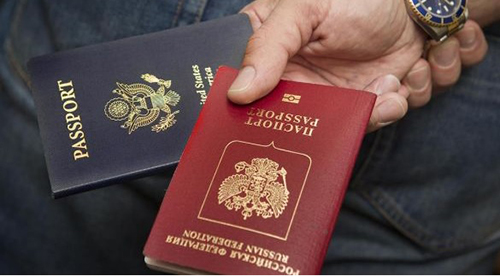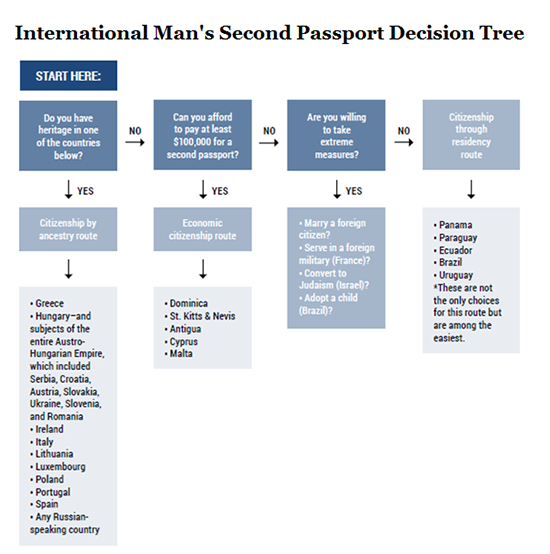
Most people have medical, life, fire, and car insurance.
Of course, you hope you never have to use these policies, but you have them anyway. They give you peace of mind and protect you if and when the worst does happen.
International diversification is the ultimate insurance policy against an out-of-control government. I call it “freedom insurance.”
International diversification frees you from absolute dependence on any one country. Achieve that freedom, and it becomes challenging for any group of bureaucrats to control you.
The results can be liberating.
You know the benefits of diversifying your investment portfolio. If you put all of your asset eggs in one basket, you could lose your entire portfolio if that basket breaks.
The same idea applies to political risk—the risk to your personal and financial wellbeing from your government.
If your home country “breaks”—as it did in Russia in the 1920s or Germany in the 1930s—you could lose everything.
The risk is rising in the US, Canada, the UK, Australia, New Zealand, and everywhere in the Western world. That’s why obtaining some Freedom Insurance now is so essential.
International diversification is a time-tested route to freedom. Wealthy people worldwide have used it for centuries to protect their money and families.
It’s all about putting different parts of your life in the most optimal jurisdictions. That way, you maximize your personal freedom and financial opportunities. While there are several core areas to consider, obtaining a second passport is a crucial piece of the puzzle.
Among other things, having a second passport allows you to invest, bank, travel, live, and do business in places you wouldn’t otherwise be able to.
But there’s another critical reason to get a second passport. Remember, your passport doesn’t belong to you. It belongs to the government, and it can cancel your passport at any moment under any pretext it finds convenient.
Having a second or third passport means that your home government can’t arbitrarily restrict your ability to travel.
Unfortunately, there is no route to a genuine second passport that is fast, easy, and cheap. Deciding the best place and way to get one is not necessarily straightforward. There is no one-size-fits-all solution.
But today, I’ll show you the path of least resistance.
It helps to view the whole world as your hunting ground. So don’t dismiss the idea of becoming a citizen of a small or backward country. Unlike countries with mega-governments, these places generally lack the capacity and desire to monitor their citizens or treat them as milk cows.
How to Get a Second Passport: The Four Roads
There are exactly four legitimate routes to a valid second citizenship and passport. So if you hear about a fifth route, it’s prudent to presume it’s a scam.
Following bad advice can create significant problems and limit your options. Instead, your goal should be minimizing problems and expanding your opportunities.
To find the best route, start with the decision tree below.

No matter the country or method, you should be able to point to specific naturalization laws with explicit requirements. Everything should be spelled out in black and white from official sources. You’ll usually find this information on a government, consulate, or embassy website.
Route No. 1: Citizenship by Ancestry
If you qualify, a citizenship-by-ancestry program is perhaps the cheapest route.
Each country has its own eligibility requirements and procedures. However, you may be eligible if you have an ancestor from one of the countries listed in the graphic above (usually no more remote than a great-grandparent). Often you can find the citizenship information on the country’s website. Or you can visit the nearest consulate.
If you’re eligible, you will need to give the consulate official legal and translated documents (birth certificates, marriage certificates, death certificates, naturalization records, etc.) proving lineage to the relevant ancestor when you apply.
Route No. 2: Economic Citizenship Programs
Economic citizenship is the most expensive route to a second passport. But it’s also the quickest.
You make a substantial payment or investment, and in return, the government grants you citizenship. You can often complete the process in a matter of weeks. And you don’t even need to live in the country.
Currently, the governments of Dominica and St. Kitts & Nevis (two English-speaking countries in the Caribbean) offer the only established and reliable economic citizenship programs. A passport from either government enables visa-free entry to most of Latin America, the Caribbean, and Europe.
Dominica is currently the cheapest option. It requires a donation to the government starting at $100,000. You should also expect additional administrative costs for due diligence, background checks, processing, and other fees. That can amount to at least $10,000.
Other countries also offer economic citizenship programs. But they haven’t been around nearly as long as the Dominica (1993) and St. Kitts (1983) programs.
A reliable and stable history is essential. Ultimately, any government can revoke the passport and citizenship of its citizens at any time for any reason, real or concocted.
A shift in the political winds could mean that an economic citizenship program in favor today could be out of favor tomorrow. That could have negative consequences for foreigners who participated in the program.
Only the St. Kitts and Dominica programs have stood the test of time (decades), with thousands of people successfully using them.
Route No. 3: Extreme Measures
If you’re willing to take extreme measures, there are shortcuts.
You could marry a foreigner. Many countries will grant citizenship to foreign spouses after some time, usually at least two years.
France grants citizenship upon completion of military service.
Jews are eligible for Israeli citizenship. However, in most cases, military service is required.
Brazil offers a shortcut to citizenship for those who adopt a child or parents of children born in the country.
Route No. 4: Naturalization Through Residency
So, if the family bloodline leads to a dead end… and you aren’t willing to marry a foreigner, serve in a foreign military, or take any other extreme measures… and you can’t afford an economic citizenship program… the last route is permanent residency.
Most countries will grant citizenship after five or so years of permanent residency. Some take more time, and some take less.
Here, again, the time requirement varies widely. And these requirements are constantly changing. Some countries require you to spend substantial time on the ground and build real connections to the country. Others are less stringent.
Some factors you should weigh in considering a country’s program:
- The required length of residency
- Minimum time required in-country during the residency period
- Costs and mandatory investments
- The requirement to demonstrate language proficiency
A Crucial Step
The easiest route to citizenship in a second country will differ for most people, depending on their circumstances. It’s not a fun process any way you slice it, but that should not dissuade you. The benefits far outweigh the costs.
The political and economic climate is constantly changing, not always for the better. It seems inevitable the situation in the US, Europe, and other parts of the world will continue to deteriorate. Obtaining the political diversification benefits of a second passport is crucial to ensuring you won’t fall victim to a desperate government.
Fortunately, there are numerous options to obtain a second passport or residency. However, the menu of options is constantly changing, and there is no one-size-fits-all solution.
Be sure to get our guide we just released on the easiest countries to get a second passport. Click here to download the PDF.

